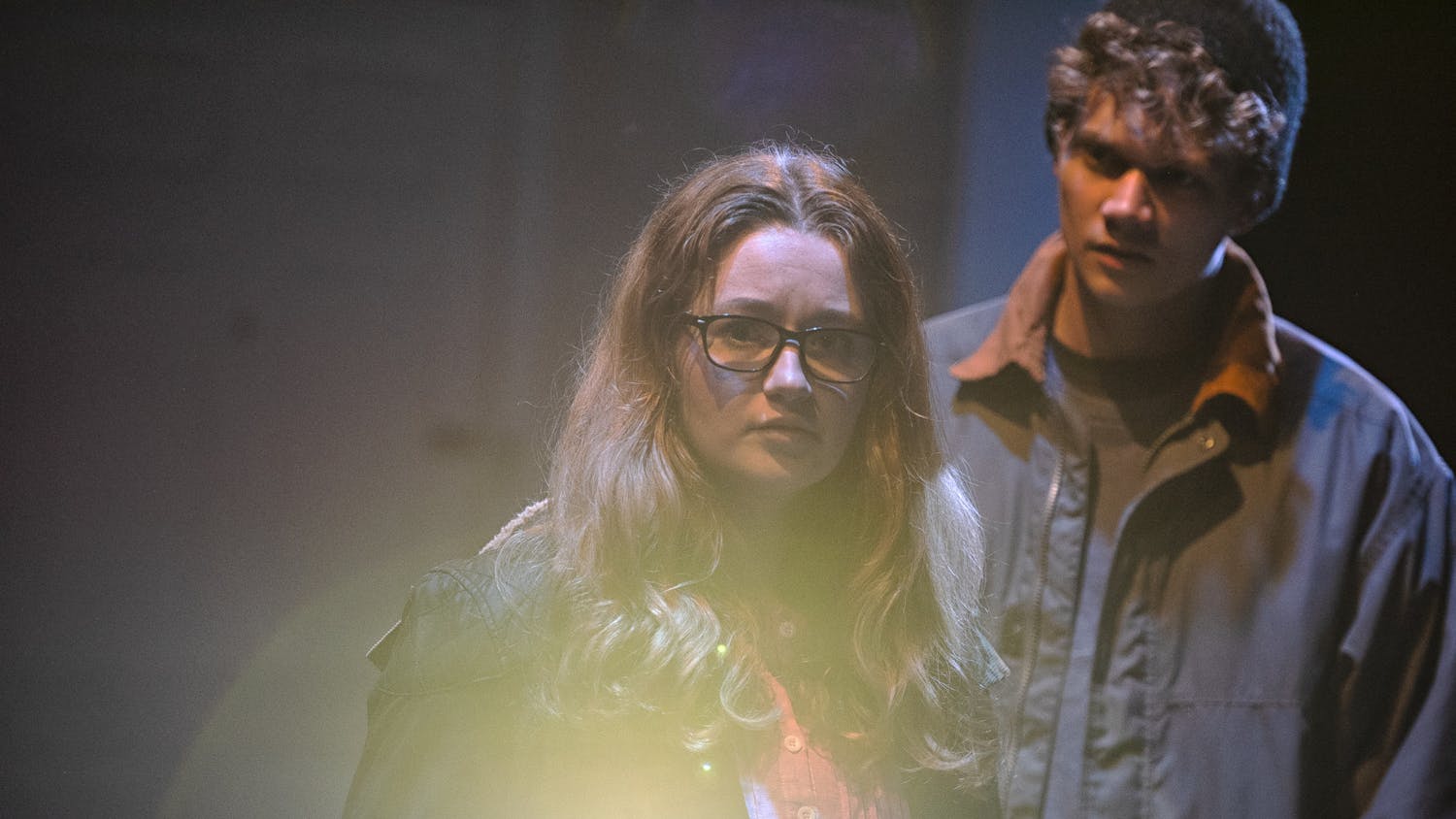Hearing a man with an Irish lilt describe murder in rhymed verse is oddly captivating. As is hearing a young woman speak passionately of a body assembled of worms, the temporary home of a soul shucked of its body. Or the tale of a woman on a mission to prevent death, only to have her efforts rewarded by more casualties. This snapshot offers only a glimpse into the power of the Abbey Theatre of Ireland’s production of Terminus, an inventive play composed of rhyming monologues that took liberties with realism and form, but had no trouble captivating the audience during its single performance on Saturday, March 5.
Terminus, written and directed by Irish playwright Mark O’Rowe, takes place in a modern Dublin where violence is commonplace and where magical realism reigns supreme. Three unnamed actors stood on stage the entire performance, surrounded by fog and a sparse set of platforms for them to stand on and large abstract angles reflecting their shadows and framing them upstage.
The play is a series of nine monologues — three for each actor. When a monologue was finished, the actor speaking would fade into the darkness as the lights focused on the next character, making sure whoever was speaking captured all of the audience’s attention.
The play began with A, played by Olwen Fouéré, a woman in her 50s who regrets many of her past actions — like sleeping with her estranged daughter’s fiancé — but is trying to remedy her wrongs by stopping a former student from aborting her nine-month old fetus. Fouéré was a favorite of many people I spoke to after the performance, mostly for her hardened nonchalance, take no prisoners attitude. B, played by Catherine Walker, is a woman in her 20s and has been scorned by life for too long. When love arrives in the form of a worm-riddled soul escaped from hell, she embraces the opportunity, although the character’s description of their rapturous night together — and all the wriggling worms that involved — inspired many offended murmurs from the audience. Walker was probably the weakest performer of the three, but the passion and innocence of her performance made her my favorite. I also think she had the best series of lines, which I’ll explain in more detail later.
C, played by Declan Conlon, is a serial killer who just wants to be loved, but is terrified of women. In a deal with the devil he trades his soul for “a voice refined, resplendent, defined by transcendent notes which rose, froze, then dipped and slipped away without a trace,” but cannot find the courage to share his gift after the deal is done.
Each of the character’s stories were fascinating on their own, but one of the most magical parts about the production was slowly uncovering the characters’ connections — that A was B’s mother, that the passionate soul B loved was the one forsaken by C, and that each character’s terminus is dependent on the decisions of those whose monologues precede and follow theirs.
Although the only movements that occurred on stage were the gesticulations and pantomimes of the stationary actors, the story the three characters wove was riveting nonetheless. When an entire play consists of only monologues and the audience must furnish most of the action with their imagination, the words in the script take on an added importance, a recognition that O’Rowe’s script much deserved. The monologues never grew tedious or monotonous, partly because of their intensity and partly because they truly were poetry, theatrical slam poetry sprinkled with copious amounts of swearing and cringe-inducing violence for flavor. You could hear the audience’s mind at work when the characters’ descriptions grew intense — the audience collectively recoiled and gasped at a particularly vivid description of A, the official badass of Terminus, poking out someone’s eyeballs, and the mention of bloodthirsty C cutting a young woman’s throat or any mention of worms provoked a similar response.
Jason Zinoman, who reviewed Terminus for the New York Times described the monologues as a “dense, musical brand of colloquial poetry that sounds like a mix between Jay-Z and Tom Wolfe on a gonzo riff,” and with a play that has the lines, “I was hopeless until hope appeared one night in my room, my fright at first sight subdued by the dude, suppressed, I confess, by the thing I missed the most; a kiss, though not from a chick, but Old Nick, the host of all the f***s who fall,” I’m not prone to argue.
In a workshop held the day after the performance, O’Rowe said that his goal as a playwright was to write scenes that he thought were cool, and the sheer joy he must have felt in finding such creative ways to rhyme with curses and make something beautiful out of such somber themes as abortion, murder, incest and fear of death, is noticeable in the performance. The actors also offered a workshop the day before the performance, and many students participated and absorbed much of the advice and knowledge these professionals had to offer.
The actors also deserve major kudos for bringing the play to life. They took a script that offers them little opportunity to move and denote action — except through inflection and a mastery of timing — and turned it into something alive and poignant. The play was a testament to the power of words — in a strange alternate realm where time is frozen, it is fine, even fantastic, that the characters tell us their deeds instead of showing us.
The point in the narrative when the play crescendoed into something to remember, something that sticks to your brain long after the curtain call, at least for me, was B’s recitation of the greatest hits of her life at the end of the play. The dying memories she spoke of — “crying the first time I slept with a guy, not knowing why, getting high, getting drunk, bingeing on junk food” — a never-ending litany of the things we all experience as young people, seemed particularly profound when performed for an audience of college students for whom her joyful reminisces seem infinitely relatable. It didn’t matter that she was speaking in rhymed verse or that there were angels trying to murder her and her only savior was a disembodied serial killer. That moment of the play was one of the most heartbreakingly human and real things I have ever seen in theater, and we weren’t even witnessing any event! Just the character’s description of the event and the emotional resonance that these experiences had on B, a resonance so palpable that is was bound to leave an imprint on the audience.
Terminus also had the peculiar gift of not letting the violence interrupt the audience’s enjoyment of the characters or the beauty of the actor’s words or diction. The violence was not something the audience ignored — we cringed at the misdeeds we heard described so vividly, but we forgave and still do forgive. We do not pass judgment, for we were in a moment suspended in time, and we did not want to ruin the slow rhythmic unraveling of these characters’ connections and passions by being offended by their choices. Judgment was passed on each of them by the end of the play; their terminus was imminent. So, we sat enraptured, completely under the spell of those nameless forces of nature, waiting for them to fall.
"Terminus" captivates audience
Comments



